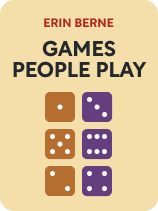

This article is an excerpt from the Shortform book guide to "Games People Play" by Eric Berne. Shortform has the world's best summaries and analyses of books you should be reading.
Like this article? Sign up for a free trial here .
Do you find small talk awkward and uncomfortable? What are the benefits of small talk? What makes small talk different from friendly conversations?
In his book Games People Play, Dr. Eric Berne analyzes human social interactions in order to better understand why people act the way they do. One subject he went into detail on was that of small talk.
Keep reading to learn about the benefits of small talk.
Small Talk: Various and Variable
Before we can discuss the benefits of small talk (or what Berne calls “pastimes”), we need to distinguish what makes small talk different from conversations. According to Eric Berne, pastimes are casual social interactions of all shapes and sizes. There’s a wide variety of pastimes, and they further vary by culture. People mainly engage in pastimes at events like parties, weddings, or company social gatherings.
Berne defines a pastime as a series of reciprocal exchanges focused around a topic—cars, annoying neighbors, celebrity gossip, relationships, and so on. So you can also think of these as polite, topical conversations: small talk.
(Shortform note: The notion of pastimes, or small talk, is a useful way of pointing out a specific kind of social behavior. At the same time, it’s also fairly deterministic: Berne suggests that most of our behaviors fall into one of a handful of categories, and within each of those we just act from scripts. Compare this to human language: While it’s true that we use some set phrases, using language is a highly creative endeavor. We mix and match words, frequently creating expressions we’ve never before spoken. If our primary tool of communication is so complex and free-form, does it make sense that our social behaviors, which are mediated by language, would be simple and predetermined? After all, culture evolves over time—and the small talk we engage in today is very different from that of Berne’s time.)
There are plenty of contemporary examples of small talk—“Have You Seen This Meme” and “Midterms are Killing Me” are common among modern college students, and the ravers among them might play “What a Trip, Man” or “One-Up My Hangover.” On-the-grind millennials might play “What’s Your Side Hustle,” while young parents favor “Kids, Am I Right?”
| A Product of His Time A number of Berne’s pastimes (and later his games) have aged poorly. In his writing, men engage in “General Motors” and “Man Talk,” while women play “Wardrobe,” “Kitchen,” and “Lady Talk.” It’s not hard to imagine these stereotypes, but to suggest that everyone’s activities fit into such cleanly segregated categories is both reductionist and prejudiced. Psychology has a long history of sexist bias. A particularly illustrative example is the idea of hysteria—think “she’s just crazy and emotional”—a hold-over from ancient Greece and Egypt that remained in the DSM through the 1950s. And given that Freud, a man not known for his sexual egalitarianism, influenced Berne, we have good reason to read his descriptions with a critical eye. |
Informal rituals mark the start and end of many types of small talk. For example, you’ll greet your friends before jumping into some activity, and the goodbye niceties also follow ritual patterns.
Berne states that small talk gets “adaptively” programmed, though he doesn’t clarify what this means. We can infer that the programs for small talk also come from cultural influences, but can change more flexibly. Small talk changes based on who’s involved, going in various directions like a flowchart.
For example, say you’re joking about your kids with a couple friends, and a child-free acquaintance comes to join in. Now the conversation will either change to accommodate her, or she’ll find some creative way to relate (maybe her cat is her baby).
Berne states that we adapt our interactions like this to provide all those involved with an opportunity to be seen and heard. It isn’t quite egalitarian, though: You have to earn that recognition. For example, think of how the “funny guy” usually gets more attention than the quieter friends of a group.
| Berne’s lack of clarity on “adaptive programming” may speak to the shortcomings of his reductionist approach. Not all phenomena have discrete, sharp boundaries, and this nebulosity can confound the “dissection” approach of most science. While physical sciences, like geology, deal with concrete realities, the human psyche famously defies clear, complete description. In leaving “adaptive programming” unexplained, Berne may be indicating one edge of his theory’s explanatory power. Building a concrete, precise model of dynamic, changing social interaction might be impossible—similarly to how we can’t precisely describe the structure of a cloud—because there are too many variables to account for: Thousands of personality variations, numerous pastimes, innumerable contexts in which they could take place, and so on. So, in short, Berne leaves it at, “it’s complicated.” |
The Benefits of Small Talk
At its most basic, small talk is an enjoyable way to use time and provide social contact for everyone involved. However, it also serves two more specific purposes, which we’ll cover below.
1. Small Talk Helps Us Find New Relationships
Berne explains that small talk helps you find potential partners for closer relationships. Your small talk reflects your games—many types of small talk are simpler, more socially acceptable versions of games. So the people whom you mesh with in more casual interaction are likely to be good partners for closer relationships.
This filtering is an unconscious process. While you’re at a social gathering, Berne says, your child intuitively sorts through the people you meet. You’ve probably experienced this—you go to a party, you meet someone new and interesting, and find you’d be happy to see them again. This is your child at work.
Berne also states that sometimes the adult handles this process. For example, if you’re a strategic person consciously looking for a romantic relationship or a useful business connection, you may more consciously look for a match, instead of leaving it to intuition.
(Shortform note: It’s a common idea that “we date our parents”, or in Berne’s terms, “we date those who play our games.” In contrast, evolutionary psychology holds that we pick partners based on who will best pass on strong genes. In this view, physical attractiveness, fitness, and intelligence play a larger role. Neither view seems to contradict the other, though, and considering both gives a more holistic view of the process. For example, you might filter potential partners through both sets of criteria: First, do they satisfy your standards for evolutionary fitness? This narrows it down a bit, but still leaves a large pool to select from. Considering who meshes with your games narrows it down even further, acting as a secondary filter that ensures you meet your psychological needs, and not just evolutionary drives.)
2. Small Talk Reinforces Our Beliefs
Think of how in-group conversations typically create a filter bubble: Everything discussed obeys the tribal group’s sanctions and taboos, and everybody (typically) validates each other. Small talk often works a good deal like this, according to Berne.
You engage in small talk from a “position.” This is a deeply held belief that usually concerns some broad, existential stance or major issue—“Big government is bad/good,” “People are basically moral/immoral,” “Children are great/awful.” That belief determines the small talk you engage in.
Then, the way you feel about that issue—the emotional aspect of your belief—determines how you show up when undertaking small talk. For example, say you believe that “coffee is superior to tea.” Depending on your emotional style, you’ll enact a particular character in casual conversations about that topic—maybe you’re an espresso maniac, or a coffee purist, or even an aggressive bean evangelist amongst your tea-drinking friends.
(Later we’ll refer to positions as stances, as in your point of view.)
| Four Fundamental Positions In a 1962 article in Transactional Analysis Bulletin, Berne introduced the concept of “okayness” to describe being basically at peace with your existence. To be OK is to respect yourself and others, and to act fairly. The psychiatrist Thomas Harris further developed Berne’s theory of positions in his 1967 book I’m OK—You’re OK. Harris outlined four fundamental “life positions” that develop in childhood: I’m OK, You’re OK I’m OK, You’re not OK I’m not OK, You’re not OK I’m not OK, You’re OK With this model, proponents of Transactional Analysis hoped to establish a set of fundamental beliefs from which all people’s scripts developed. Depending on your earliest experiences, you would end up with one of the four life positions—and in theory, all of your behavior would be rooted in that deepest belief. |
Your friends can then receive your act in one of two ways, according to Berne. Both serve to reinforce your existing belief:
- They could receive you well and agree with the stance you express. Continuing the above example, say that your coffee drinking friends validate your love for cold brew. This confirms to you that your belief is the correct one, which reinforces it.
- Or, they could disagree with you and may get antagonistic. Maybe Brad thinks Matcha green tea beats coffee any day and scoffs at you. An argument may ensue, which will also entrench your beliefs.
(Shortform note: In another example of Berne’s apparent reductionism, he gives just two ways an interaction can go: up or down. Yet it’s possible to communicate more intelligently, to change people’s minds, and to successfully manage difficult conversations. For Edwin Rutsch, creator of the Empathy Circle conversational modality, active listening is the key to a more empathetic culture. In an empathy circle, you patiently listen, acknowledge, and reflect the speaker’s words back to them, and they do the same for you when it’s your turn. The idea is not to debate, but to engage in a structured dialogue that opens our ears to new perspectives. Interactions that reinforce your beliefs, whether through affirmation or confrontation, are not the only possibility.)
In the language of T.A., this is the “existential advantage” of pastimes, or small talk: It confirms beliefs that concern your worldview. Each confirmation helps you to feel like you have the “right” views on the world. Berne’s implication is that we unconsciously seek out experiences that confirm our existing beliefs.
Berne says that our stances develop while we’re young and tend to become fixed. And because beliefs are self-reinforcing feedback loops, as described above, you can easily fall into the trap of defending beliefs that have long since become unconstructive.
(This is the trouble with games. While pastimes are typically mild, like the coffee example above, game dynamics are more intense. More on this soon.)
(Shortform note: In more modern language, Berne seems to have noticed some form of confirmation bias: When we engage in small talk, we’re primed to agree with things that reinforce our beliefs (and we discount things that contradict them.) For example, you might catch yourself instinctively disagreeing with a political stance from the other side of the spectrum, even if you haven’t investigated the issue. We’re also prone to self-fulfilling prophecies: If you believe something to be true, you’re likely to act accordingly, and that brings that belief closer to reality. For example, this is the psychological underpinning of “fake it till you make it”: if you regularly practice acting confident, you’ll eventually develop that capacity.)
3. Small Talk Facilitates Tribal Dynamics
Different types of small talk tend not to mix with each other, Berne explains. Dividing lines often form along demographic boundaries—for example, Ivy League types might chat about who launched what startup, while state college graduates might talk about how tough the job market is.
If you don’t “get with the program” of a group you’ve walked into, they might reject you. For example, if a lifestyle gamer tries to socialize with a group of gym-lifers discussing their routines, they’ll probably reject her. But if you adapt to the pastime, the group may welcome you. Say that the gamer really wants to start lifting, and the gym friends would love to show her the ropes.
Some groups, Berne says, also have accommodating leaders who will state the program and make it easier to join in. For example, you walk up to a group and a woman says “Hey, we were just talking about bad housemate experiences. Got any interesting stories?”
(Shortform note: Berne’s notion of exclusionary small talk may have been a product of his time. These days many people have a wide variety of interests and hobbies, and demographic lines aren’t always a useful way to distinguish between people’s lifestyles and social habits. For example, maybe those lifters mentioned above are also gamers—the old stigma of gaming-as-geeky is fading, and gaming seems to transcend demographic lines, being widespread among men and women, across various ethnicities and age groups. So they may have welcomed the new person, especially if she also showed some interest in lifting.)
2 Ways to Classify Small Talk
Berne details several ways to classify pastimes, with varying levels of clarity. Below, we’ve described the two clearest schemes, and updated the examples.
Based on Demographics: As mentioned above, small talk often differs from one demographic to the next. People of different ages, genders, and income brackets tend to engage in different chat. For example, college-age guys and gals might chat about recent concert or music festival experiences, whereas lots of older folks love discussing the national news or their golf swings.
Based on Ego States: Some small talk takes three distinct forms depending on the ego states involved: adult-adult, child-child, and parent-parent. The chat “Kitchen,” can occur as two adults discussing the pros and cons of different stoves; as two children playing house; or as two parents trading recipes and admiring the marble countertops.
(Shortform note: A 2012 paper from UC Berkeley’s psychology department holds that social class very much determines the set of behaviors someone expresses. We all have a class mindset embedded in us, which is reinforced by the environments we live in. This seems to support Berne’s theory: If everyone around you drinks $7 Starbucks mixes and drives luxury cars, you’ll play a different set of pastimes than those who grab $1 McDonald’s coffee in their beat-up 2000 Civics. On other hand, another study from the same report demonstrated that class isn’t rigid: After sending interdependence-emphasizing welcome messages (a common value for poorer demographics) to first generation college students, they found that those students performed just as well as students from college-educated families.)

———End of Preview———
Like what you just read? Read the rest of the world's best book summary and analysis of Eric Berne's "Games People Play" at Shortform .
Here's what you'll find in our full Games People Play summary :
- The many ways that we relate to one another through “games”
- Why you might be missing out on the fulfillment of game-free living
- How to identify and overcome unhealthy games






